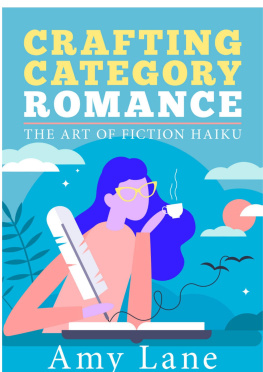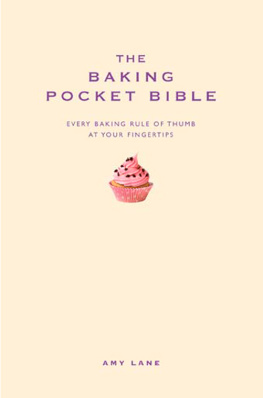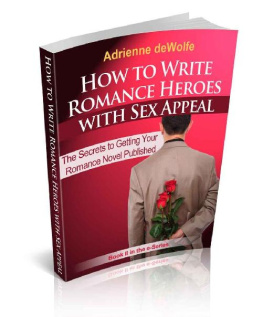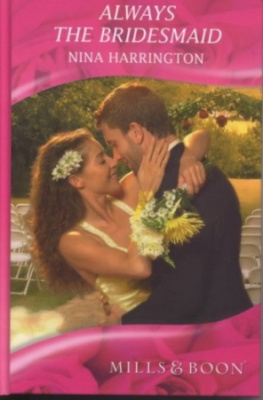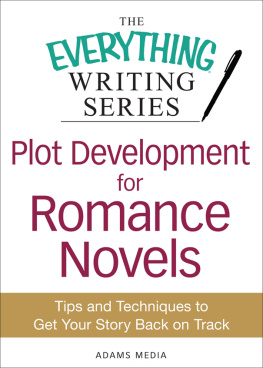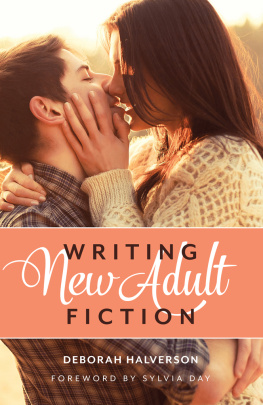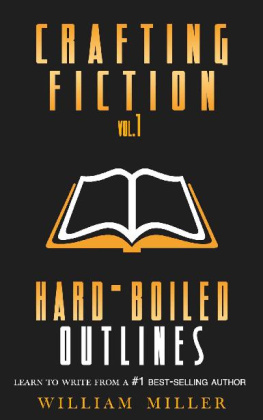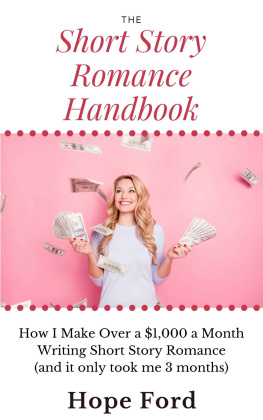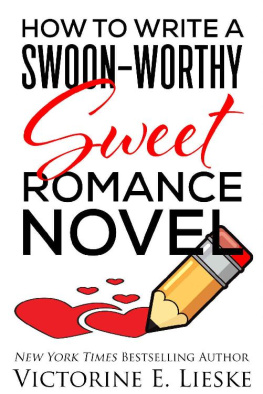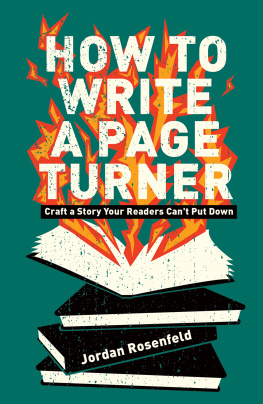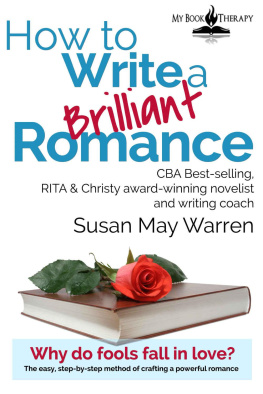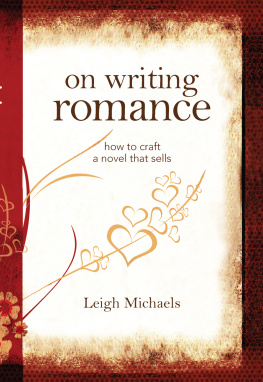Table of Contents
Crafting Category Romance
By Amy Lane
Category romance is a precise art. With such a small word count, writing the perfect category romance is a little like writing a haiku. But how do you write a book in seventeen syllables? How can you cram compelling conflict, satisfying character development, and toe-curling romantic tension into less than sixty thousand words?
In Crafting Category Romance, two-time RITA-nominated author of nearly one hundred books Amy Lane describes the rules of engagement, traps to watch out for, and how to leverage common tropes to create conflict, craft a character, develop a plot, and leave readers with a happy ever after that's different every timeall in a tidy package. With practical exercises in plot, conflict, and character development, Crafting Category Romance will teach you how to use the rigid rules and expectations of the genre to your advantage and win a loyal readership following for life.
Dedication
I USUALLY dedicate my books to my familyand Mate and the kids get a nod here because I babbled about this book forever and they deserve some thanks. But this book never would have happened if people like Damon Suede and Elizabeth North and Karen Rose and Tere Michaels and Lynn West and Mary Calmes and Rayna Vause and Brenda Chin hadnt had the solid urge to talk story to me at every opportunity.
This book is for every writer who has thought about craft and struggled to perfect it, and has gone on to share what they have learned.
May we continue to talk story until every generation is thrilled at the stories they may tell.
Acknowledgments
AHERM. DAMON Suede revised this book three times. The first time it was a massive disaster. So, yes, he did con meerm, talk me, erm, convince me to write the damned thing, but he definitely walked the talk when it came to helping me not make a complete ass of myself, so he gets an entire paragraph of acknowledgment to his own magnificent person. Hes earned it in spades.
But hes not the only one.
Cindy Dees, Anna J. Stewart, and Sue Brown-Moore all gave me quotes and encouragement and also talked story with me and helped this book come to be. Suzanne Brockmann was planning on itbut it turned out I found the perfect interview from a few years ago, so really, all I had to do was wish her safe travels as she navigated the desert. Im so grateful she was willing. Everyone who helped me with book recommendations, including all of the aforementioned awesomesauce people, and LaQuette, who has been a lovely and true friend, deserves some thanks here.
Brenda Chin edited for meand wed only just come to know each other as she edited my fiction through Dreamspinner. She wrote my foreword, she encouraged me, and she told me it didnt suck. And oh boy, did I need to hear that.
Elizabeth North gave me the opportunity with this nonfiction book that I never dreamed of.
So thank youall of youfor sharing the vast array of your experience and talent. I am in awe of the company I keepthis book couldnt have happened without you.
Foreword
I CANT remember a time in my life when I wasnt reading everything I could get my hands on. At seven I became a regular at our local library, devouring middle-grade fiction like Where the Red Fern Grows, as well as many of the original stories behind my favorite Disney moviesPeter Pan by J. M. Barrie, The Hundred and One Dalmatians by Dodie Smith, Bambi by Felix Salten, Escape to Witch Mountain by Alexander Key, and, of course, The Jungle Book by Rudyard Kipling. At ten I moved on to my dads Zane Grey westerns and Frank Yerbys historical epics, as well as my grandmothers Victoria Holt gothics. But one March break when I was twelve, my grandmother gave me Kathleen Woodiwisss Ashes in the Wind to read, and that was itI was hooked on romance. Throughout my teenage years, I read close to fifteen novels a weekbooks by Bertrice Small, Jennifer Wilde, Rosemary Rogers, Laurie McBain, and Johanna Lindsey, to name just a few. I couldnt get enough of them.
But it wasnt until I started at Harlequin in 1988 that I read my first category romance novel. Of course, Id heard of them. But stories featuring meek nurses who fell for rich alpha doctors never really caught my interest. However, once I started working there, I discovered that there was so much more to category romance than I thought. I quickly identified with the strong heroines of Harlequin Temptation, and got my historical fix with Harlequin Historicals, which had just launched earlier that same year. I even learned all about mores and manners of Regency England while working with Marmie Charndoff of Harlequin Regency Romance. Throughout my time at Harlequin, I was lucky enough to work with the editors of almost every romance series coming out of the Toronto office.
I still cant believe it took me all that time to discover one of the greatest treasures in the fiction worldcategory romance.
While Ill always love reading historicals, category romances give me something altogether different.
Theyre short, so they dont involve a big time commitment. I can finish a book in an hour or two and get my dose of happiness for the day. I have a problem putting down a good book (I was in the midnight lineup for the last few Harry Potter books. I got the last one at 1:00 a.m. and finished it by 4:00 a.m.), so for me, this instant gratification is important.
I can see myself in the characters. When I worked on Harlequin Temptation and then Harlequin Blaze, I used to say that the heroines got into situations I could have, when I was that age. Only I didnt have the nerve to go for it, and they do. I love living vicariously through characters I like and can identify with.
My favorite authors write a lot of books. In category romance, an author needs to write at least three books a year in order to keep a following (and more is even better). Theres nothing worse than having to wait for two years to find out whats going to happen to an interesting character youve just met.
Theres a category series for almost everything. Like short and sexy? There are a few series to choose from. Or small-town stories with family values? Suspense? History? Paranormal? Youll find it all in category romance.
A happy ending is a guarantee. You dont have to worry about it. (Ill admit, I read the end of every Harry Potter book before starting it. If J.K. Rowling had killed off Harry, as it had been hinted, I wouldnt have read it. Then again, I also stopped reading A Song of Ice and Fire in the third book because I didnt want to see what happened to Robbs wolf. Ill admit itIm a bit of a wuss.) That happy ending is everything to category readers. When youve had a bad day, when your life is turning upside down, when nothing looks like its going right, you can count on a category romance to lift your spirits with a happy ending. Thats better than Prozac!
But putting these wonderful tales together isnt easy. In fact, in many cases its more difficult than writing a single title novel, because the author has fewer words to get the story across, as well as a lot of reader expectations. So whats the secret to writing these shorter stories that mean so much?
Thats what youre going to find out in this book. I leave you in the very capable hands of a master storyteller, Amy Lane, who promises to spill some of her secrets in the following pages. I hope you enjoy learning all about the art of Fiction Haiku. I certainly did.
Brenda Chin
Editor
Authors NoteAmys Nostalgia Lane
WHEN I was a kid, reading was not really considered a valuable use of my time.
I remember staying with my grandparents and my grandfather getting upset with me because I had my nose in a booka romance book60 percent of the time.

